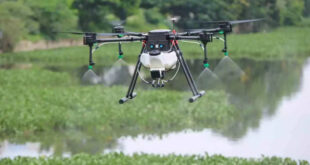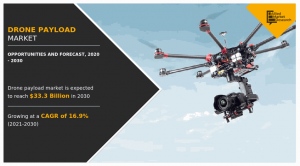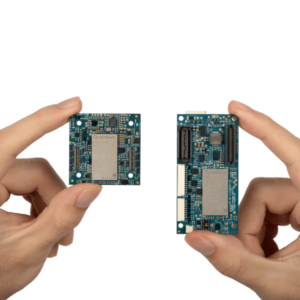 Even Smaller, Smarter and Safer
Even Smaller, Smarter and Safer
New ModalAI VOXL 2 Mini Autopilot Packs Supercomputing Power in Smallest Form Factor Yet
By: Dawn Zoldi
Until just a few days ago, ModalAI’s VOXL 2 was the world’s smallest flying supercomputer. The San Diego, California based company just outdid itself with its newest release, the VOXL 2 Mini. Here’s how this latest Blue UAS Framework-compatible assembled-in-the-USA autopilot stacks up and infuses an impressive amount of computing power in the industry’s smallest sized form factor to date.
Smaller
ModalAI reduced the size of its already incredibly small VOXL 2 autopilot by 30 percent. The VOXL 2 occupies an already extraordinarily small amount of onboard space (70mm x 36mm dimensions) for makers of any small robot or drone. The VOXL 2 Mini packs the exact same power into a size-reduced 42mm x 42mm area. Overall, the entire computing stack is as small as an Oreo cookie.
And it weighs slightly less than an Oreo! A regular Oreo cookie weighs about 11.3 grams; the VOXL 2 Mini weighs 11 grams. This is a 5g decrease in weight from its predecessor, the already light 16g VOXL 2 (which, incidentally, weighs somewhere between the Double Stuf and the limited edition Mega Stuf Oreo).
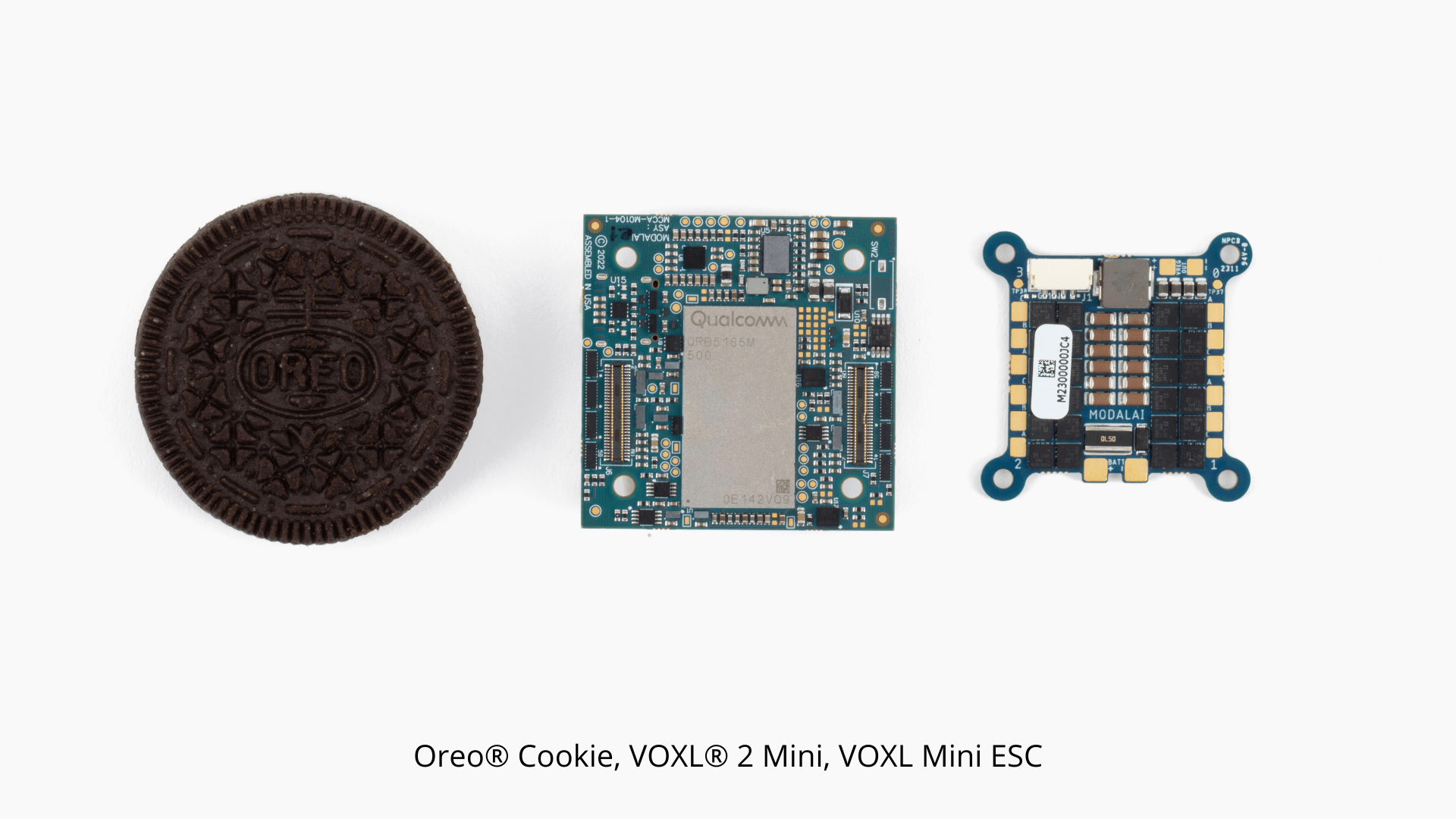
The company loaded this smaller autopilot up with the same smart processing power as the VOXL 2 to innervate even smaller and smarter drones and robots.
Smarter
Autonomous navigation remains a critical feature for any mission-critical drone or robot. Increasingly, resilience and the ability to operate in complex and challenging environments rank high on the must-have list. The VOXL 2 Mini provides for both.
Powered by the same technology as VOXL 2, the VOXL 2 Mini also features the powerful Qualcomm QRB5165 with 8 cores up to 3.091GHz, four MIPI-CSI image sensor inputs, pre-configured accessories for WiFi, 4G/5G, and Microhard connectivity.
Both autopilots provide 4 times the computing power of the company’s original VOXL offering. They also integrate the PX4 real-time flight controller, a state-of-the-art CPU, video encoder, GPU and Neural Processing Unit (NPU), with ModalAI’s open VOXL SDK.
To complement the VOXL 2 Mini is the company’s new ESC Mini. The ESC Mini combines two traditionally separate boards: an integrated power management system (APM) and 4-in-1 electronic speed controller (ESC), into one SWAP-optimized PCB with less cabling and less weight – only 5.8g compared to 16g for the previous ESC and APM combination. The ESC’s advanced control algorithms allow for open and closed loop operation with accurate RPM control. The ESC Mini’s closed loop RPM controller actively monitors and adjusts the speeds of the motors based on the commands from the Flight Controller, similar to the cruise control in a car. This precise tuning enables VOXL 2 Mini-powered drones to fly even more accurately; improving flight time efficiency.
The VOXL 2 Mini is more alike than different from its precursor, though. It leverages the same image sensors as VOXL 2 for best-in-class computer vision performance. It comes with support for thermal payloads like FLIR Lepton®and Boson®. And more sensors equals more safety.
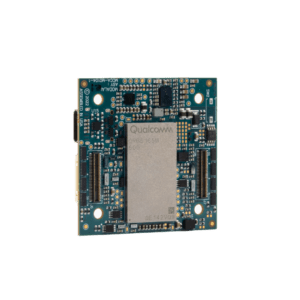 Safer
Safer
The VOXL 2 Mini contains innovative artificial intelligence (AI) to accelerate vehicle autonomy. Its use of QRB5165’s Qualcomm AI Engine pushes 15 trillions of operations per second, or “tera operations per second” (TOPS) of AI performance with industry leading power consumption.
It also provides unparalleled Visual Inertial Odometry (VIO), to fly safely and reliably. VIO uses visual and inertial data to measure distance traveled and 3D space positions in a localized environment without the need to have a GPS signal.
VIO acts as the foundation of other computer vision functions including obstacle avoidance, SLAM, position control and autonomous navigation in GPS-denied environments. VOXL 2 Mini’s SDK integration completes the loop to direct the autonomous behaviors required to safely and reliably avoid obstacles, including mapping and planning software and Collision Prevention.
The VOXL 2 Mini can also integrate PMD’S Time of Flight (ToF) sensor, for even more robust and reliable mapping for indoor autonomous navigation, even in GPS-denied environments.
And Even Easier
VOXL 2 Mini’s compatibility with popular development, open software and other Blue UAS Framework components make it the ideal platform to more rapidly and easily accelerate the development of the smallest, smartest and safest drones and robots yet.
The VOXL 2 Mini can plug-and-play with and other Blue UAS Framework image sensors, radios and connectors. Its ability to sync with popular dev tools such as PX4, ROS 2, Open CV, Open CL, and TensorFlow Lite makes it even more developer-friendly. Finally, VOXL 2 Mini’s hardware, designed with an industry standard 30.5mm x 30.5mm mount add to the ease of upgrade for the smallest drone and robotic designs.
“The response to VOXL 2 has been incredible, and we are thrilled for customers to experience the same powerful computing in an even smaller design,” said Chad Sweet, CEO and co-founder of ModalAI, Inc. “VOXL 2 Mini delivers the same performance as its VOXL 2 predecessor in a smaller form factor, ideal to mount onto sub 150-250g drones”.
To learn more about ModalAI’s VOXL 2 Mini autopilot: https://modalai.com/voxl-2-mini
Read more:

Dawn M.K. Zoldi (Colonel, USAF, Retired) is a licensed attorney with 28 years of combined active duty military and federal civil service to the U.S. Air Force. She is the CEO & Founder of P3 Tech Consulting and an internationally recognized expert on uncrewed aircraft system law and policy. Zoldi contributes to several magazines and hosts popular tech podcasts. Zoldi is also an Adjunct Professor for two universities, at the undergraduate and graduate levels. In 2022, she received the Airwards People’s Choice Industry Impactor Award, was recognized as one of the Top Women to Follow on LinkedIn and listed in the eVTOL Insights 2022 PowerBook. For more information, follow her on social media and visit her website at: https://www.
Miriam McNabb is the Editor-in-Chief of DRONELIFE and CEO of JobForDrones, a professional drone services marketplace, and a fascinated observer of the emerging drone industry and the regulatory environment for drones. Miriam has penned over 3,000 articles focused on the commercial drone space and is an international speaker and recognized figure in the industry. Miriam has a degree from the University of Chicago and over 20 years of experience in high tech sales and marketing for new technologies.
For drone industry consulting or writing, Email Miriam.
TWITTER:@spaldingbarker
Subscribe to DroneLife here.
https://dronelife.com/2023/05/03/smaller-smarter-and-safer-modalai-voxl-2-mini-is-a-supercomputer-the-size-of-an-oreo/
 Unmanned Aerial Vehicle The latest drone news
Unmanned Aerial Vehicle The latest drone news
